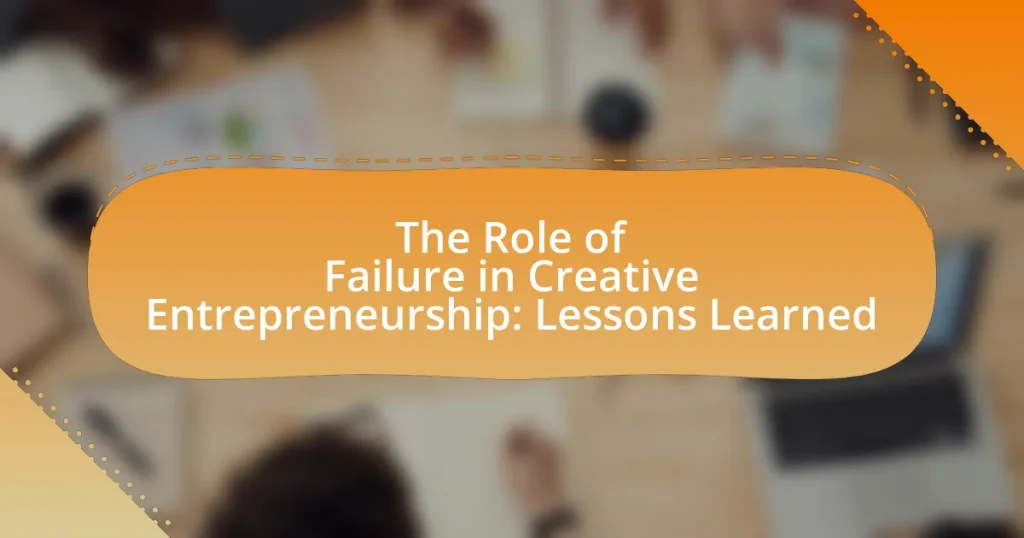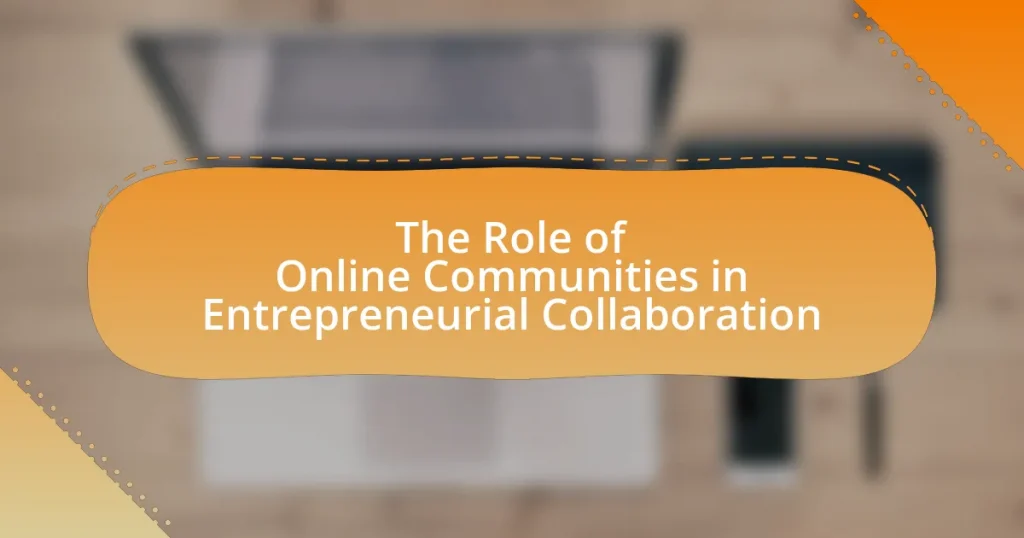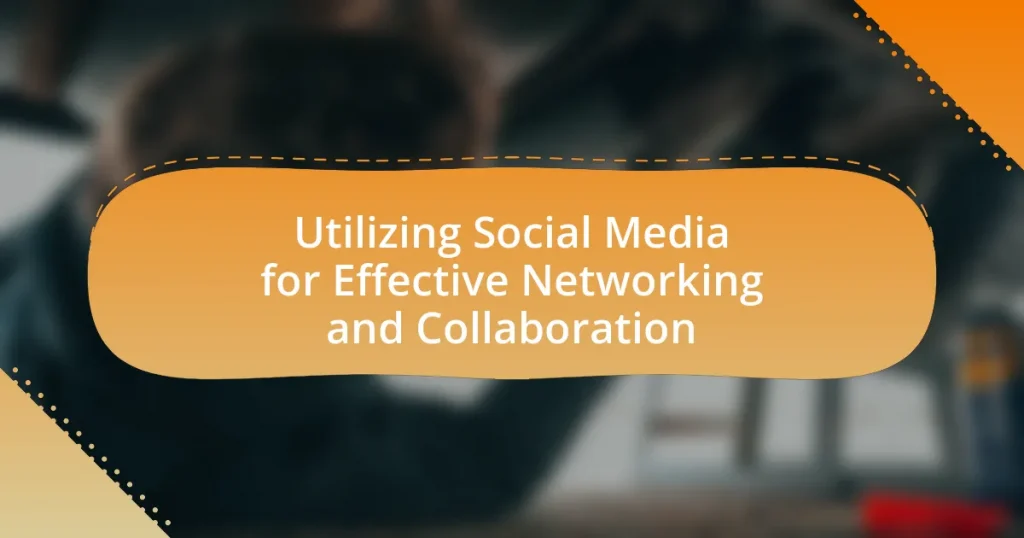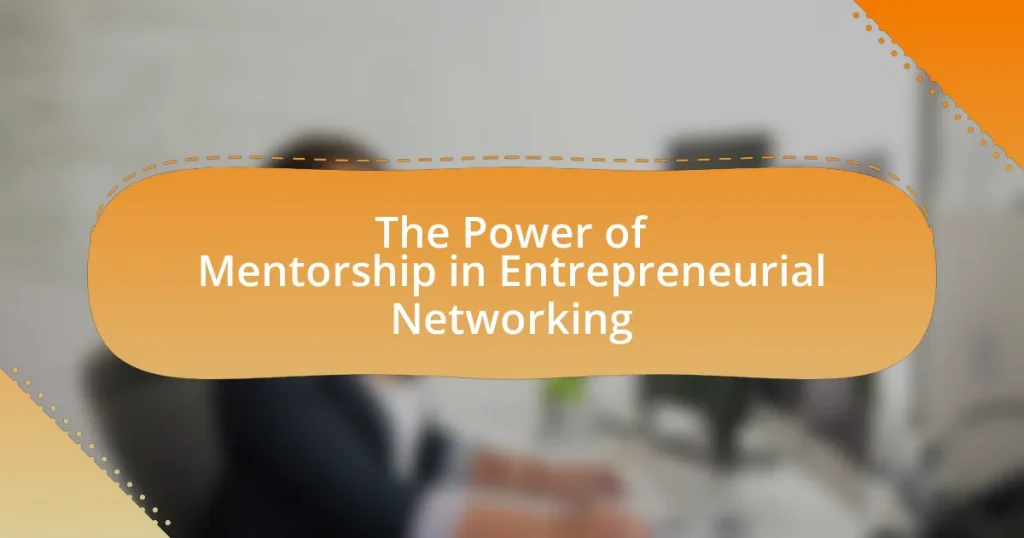The article examines the critical role of failure in creative entrepreneurship, highlighting how setbacks serve as catalysts for innovation and learning. It discusses the prevalence of failure among startups, with research indicating that 70% of them do not succeed, and emphasizes the importance of resilience and adaptability in overcoming challenges. Key insights include the psychological effects of failure on entrepreneurs, the types of failures they face, and strategies for leveraging these experiences to foster growth and improve future decision-making. The article also explores how mentorship and a growth mindset can enhance the ability to learn from failure, ultimately contributing to entrepreneurial success.
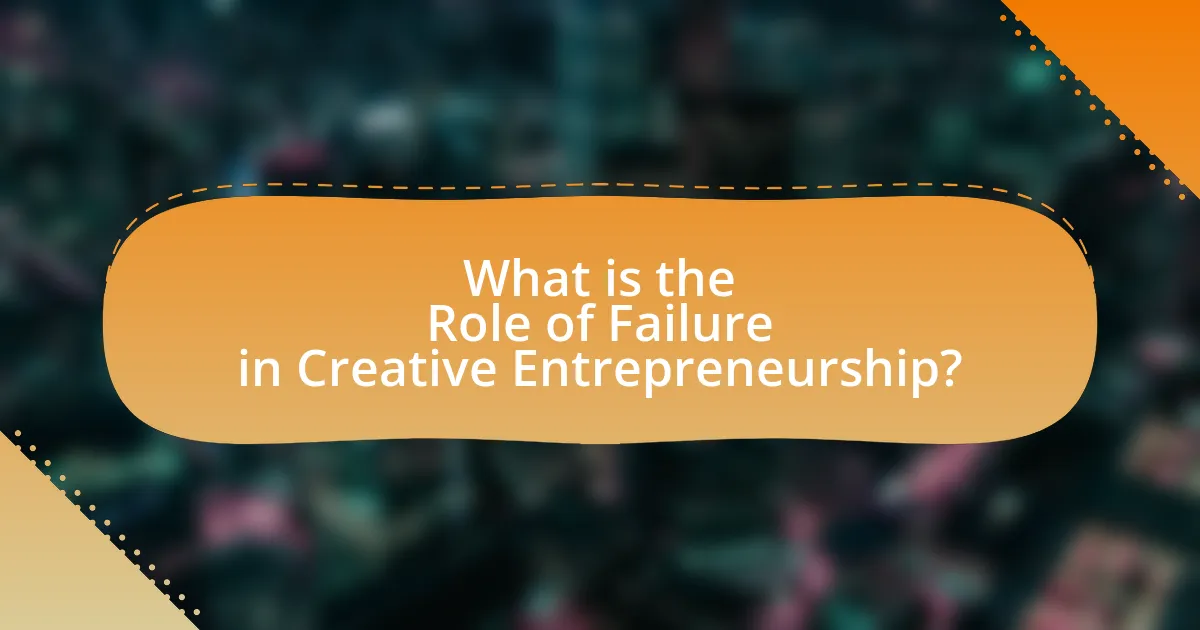
What is the Role of Failure in Creative Entrepreneurship?
Failure plays a crucial role in creative entrepreneurship by serving as a catalyst for innovation and learning. Entrepreneurs often encounter setbacks that challenge their initial ideas, prompting them to reassess and refine their approaches. Research indicates that 70% of startups fail, highlighting the prevalence of failure in the entrepreneurial landscape. This failure provides valuable insights, allowing entrepreneurs to identify weaknesses in their business models and adapt accordingly. For instance, the experience of companies like Airbnb and Slack demonstrates how initial failures led to significant pivots that ultimately contributed to their success. Thus, failure is not merely an obstacle but a fundamental component of the creative entrepreneurial process, fostering resilience and adaptability.
How does failure influence the creative process in entrepreneurship?
Failure significantly influences the creative process in entrepreneurship by serving as a catalyst for innovation and learning. When entrepreneurs encounter setbacks, they are often compelled to reassess their strategies, leading to new ideas and approaches. Research indicates that 70% of entrepreneurs who experience failure report that it ultimately contributed to their future success by fostering resilience and adaptability. This iterative process of trial and error encourages entrepreneurs to experiment, refine their concepts, and develop more robust business models, thereby enhancing their creative capabilities.
What are the psychological effects of failure on creative entrepreneurs?
The psychological effects of failure on creative entrepreneurs include increased anxiety, diminished self-esteem, and a heightened fear of future risks. These entrepreneurs often experience feelings of inadequacy and self-doubt, which can lead to a reluctance to pursue new opportunities. Research indicates that failure can trigger a stress response, impacting mental health and overall well-being. For instance, a study published in the Journal of Business Venturing found that entrepreneurs who faced failure reported higher levels of depression and anxiety compared to their successful counterparts. This emotional toll can hinder creativity and innovation, as the fear of failure may stifle risk-taking behavior essential for entrepreneurial success.
How can failure lead to innovative solutions in business?
Failure can lead to innovative solutions in business by providing critical insights that drive creativity and problem-solving. When businesses encounter setbacks, they are often forced to reevaluate their strategies, leading to the exploration of alternative approaches and ideas. For instance, companies like Apple and Google have publicly acknowledged that their failures, such as the Apple Maps launch and Google Wave, prompted them to innovate and improve their products significantly. Research by Harvard Business School indicates that organizations that embrace failure as a learning opportunity are more likely to foster a culture of innovation, as they encourage experimentation and risk-taking. This iterative process of learning from mistakes ultimately results in more effective and creative solutions.
Why is failure considered a vital component of entrepreneurial success?
Failure is considered a vital component of entrepreneurial success because it provides essential learning opportunities that drive innovation and resilience. Entrepreneurs often encounter setbacks that reveal weaknesses in their business models or strategies, prompting necessary adjustments. For instance, a study by Harvard Business School found that 75% of successful entrepreneurs experienced at least one failure before achieving success, highlighting that these experiences foster critical problem-solving skills and adaptability. This iterative process of trial and error enables entrepreneurs to refine their approaches, ultimately leading to more sustainable and successful ventures.
What lessons can entrepreneurs learn from their failures?
Entrepreneurs can learn resilience and adaptability from their failures. Resilience allows them to recover from setbacks, while adaptability enables them to pivot their strategies based on lessons learned. For instance, a study by Harvard Business School found that 75% of successful entrepreneurs experienced significant failures before achieving success, highlighting the importance of learning from mistakes. Additionally, analyzing failure can lead to better decision-making and innovation, as entrepreneurs refine their approaches based on past experiences.
How does embracing failure contribute to resilience in entrepreneurship?
Embracing failure significantly contributes to resilience in entrepreneurship by fostering a growth mindset and encouraging adaptability. Entrepreneurs who view failure as a learning opportunity are more likely to analyze their mistakes, extract valuable lessons, and apply those insights to future endeavors. Research indicates that 70% of entrepreneurs experience failure before achieving success, highlighting the importance of resilience in navigating challenges. This iterative process of learning from failure builds mental toughness and enhances problem-solving skills, ultimately leading to sustained entrepreneurial success.
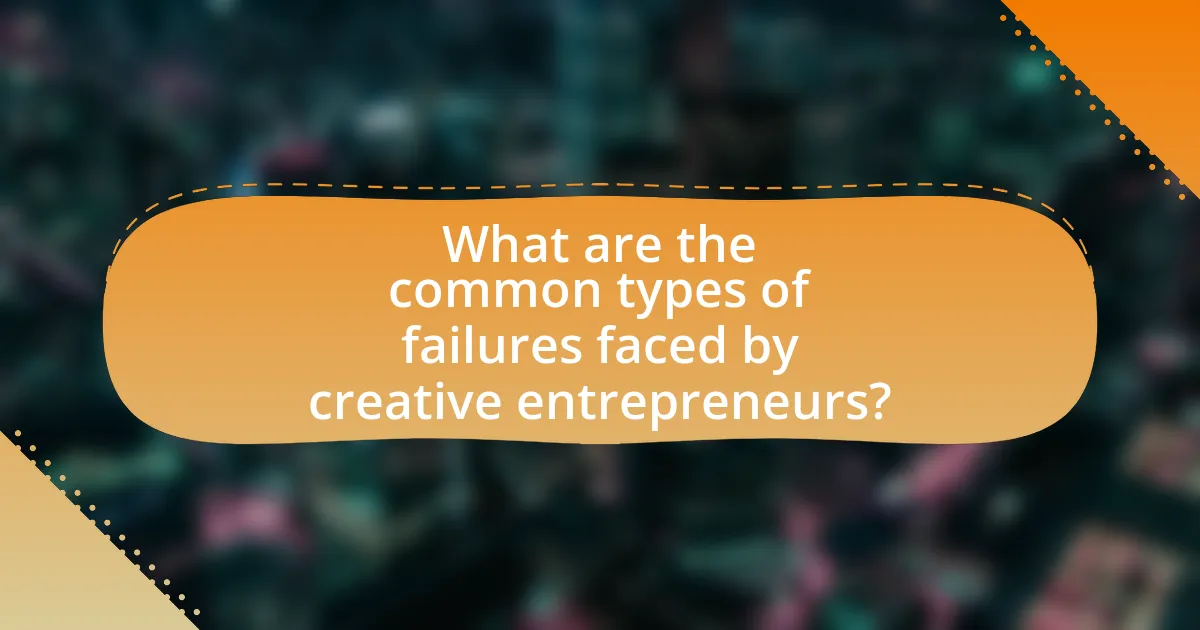
What are the common types of failures faced by creative entrepreneurs?
Creative entrepreneurs commonly face failures such as financial instability, lack of market demand, and creative burnout. Financial instability often arises from inadequate funding or poor financial management, leading to cash flow issues that can jeopardize business sustainability. Lack of market demand occurs when the products or services offered do not resonate with target audiences, resulting in low sales and potential business closure. Creative burnout, a psychological failure, can stem from the pressures of constant innovation and high expectations, leading to decreased productivity and motivation. These failures are documented in various studies, including the “Creative Industries: A Study of Failure” by the Creative Industries Federation, which highlights the significant impact of these challenges on the longevity of creative ventures.
What are the different categories of failure in creative ventures?
The different categories of failure in creative ventures include conceptual failure, execution failure, market failure, and financial failure. Conceptual failure occurs when the idea lacks originality or relevance, leading to a disconnect with the target audience. Execution failure arises from poor implementation of the creative concept, often due to inadequate planning or resource allocation. Market failure happens when the product or service does not meet market needs or fails to gain traction, which can be evidenced by statistics showing high rates of startup closures due to lack of market demand. Financial failure is characterized by insufficient funding or mismanagement of financial resources, which can lead to insolvency. Each category highlights distinct challenges that creative entrepreneurs face, underscoring the multifaceted nature of failure in this field.
How do financial failures impact creative entrepreneurship?
Financial failures significantly hinder creative entrepreneurship by limiting access to resources and reducing confidence among entrepreneurs. When creative entrepreneurs experience financial setbacks, they often face difficulties in securing funding for future projects, as investors may perceive them as high-risk. According to a study published in the Journal of Business Venturing, approximately 70% of startups fail due to financial mismanagement, which directly correlates with a decrease in innovative output and market competitiveness. Additionally, financial failures can lead to a loss of motivation and creativity, as entrepreneurs may become risk-averse, stifling their ability to explore new ideas and ventures.
What role does market rejection play in the entrepreneurial journey?
Market rejection serves as a critical feedback mechanism in the entrepreneurial journey, guiding entrepreneurs to refine their products and strategies. When a market rejects a product, it highlights misalignments between the offering and customer needs, prompting entrepreneurs to reassess their value propositions. For instance, a study by Harvard Business School found that 75% of startups fail due to a lack of market demand, underscoring the importance of understanding customer preferences. This rejection can lead to iterative improvements, pivoting business models, or even the development of entirely new ideas, ultimately fostering resilience and adaptability in entrepreneurs.
How can entrepreneurs effectively respond to failure?
Entrepreneurs can effectively respond to failure by analyzing the reasons behind the failure, learning from the experience, and adapting their strategies accordingly. This approach allows them to identify specific areas for improvement, which is crucial for future success. Research indicates that 70% of entrepreneurs who reflect on their failures report improved decision-making in subsequent ventures. By embracing a growth mindset, entrepreneurs can transform setbacks into valuable lessons, ultimately enhancing their resilience and innovation in the competitive landscape.
What strategies can be employed to learn from failure?
To learn from failure, individuals can employ strategies such as conducting a thorough post-mortem analysis, seeking feedback, and reframing the failure as a learning opportunity. Conducting a post-mortem analysis involves reviewing what went wrong, identifying specific mistakes, and understanding the underlying causes, which can lead to actionable insights. Seeking feedback from peers or mentors provides diverse perspectives that can highlight blind spots and areas for improvement. Reframing failure as a learning opportunity encourages a growth mindset, allowing individuals to view setbacks as essential steps in the creative process. Research indicates that entrepreneurs who actively analyze their failures are more likely to succeed in future endeavors, as they develop resilience and adaptability.
How can failure be reframed as a learning opportunity?
Failure can be reframed as a learning opportunity by analyzing the reasons behind the failure and extracting valuable insights for future endeavors. This process encourages individuals to view setbacks not as definitive endpoints but as critical feedback that informs their strategies and decision-making. Research by the Harvard Business Review indicates that entrepreneurs who embrace failure as a learning experience are more likely to innovate and succeed in subsequent ventures. By adopting a growth mindset, individuals can transform negative experiences into constructive lessons, ultimately enhancing their resilience and adaptability in the entrepreneurial landscape.
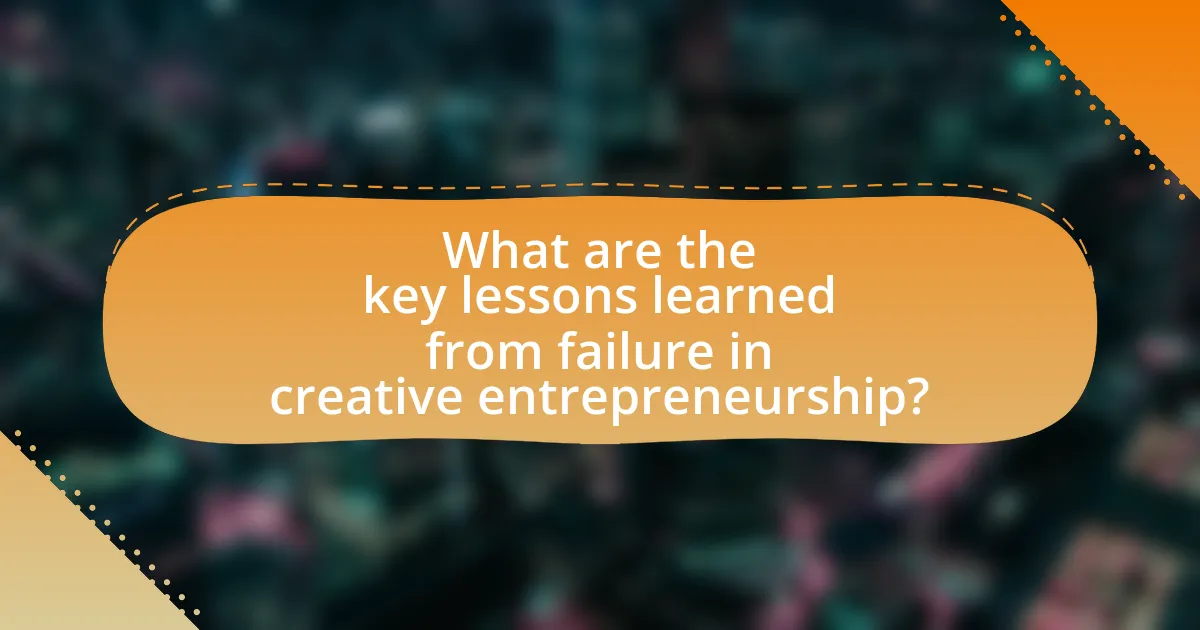
What are the key lessons learned from failure in creative entrepreneurship?
Key lessons learned from failure in creative entrepreneurship include the importance of resilience, adaptability, and the value of feedback. Resilience enables entrepreneurs to recover from setbacks, as evidenced by studies showing that 70% of startups fail, yet many founders continue to innovate and launch new ventures. Adaptability is crucial, as entrepreneurs must pivot their strategies based on market demands; for instance, companies like Slack evolved from a failed gaming startup to a leading communication platform. Lastly, seeking and incorporating feedback fosters improvement, with research indicating that businesses that actively solicit customer input are 60% more likely to succeed in the long term.
How can failure shape an entrepreneur’s future decisions?
Failure can significantly shape an entrepreneur’s future decisions by providing critical insights and fostering resilience. When entrepreneurs experience failure, they often analyze what went wrong, leading to improved decision-making processes in future ventures. For instance, a study by Harvard Business School found that entrepreneurs who faced setbacks were more likely to pivot their strategies based on lessons learned, ultimately increasing their chances of success in subsequent endeavors. This iterative learning process allows entrepreneurs to refine their business models, better understand market demands, and develop stronger risk management strategies, thereby enhancing their overall effectiveness in future business pursuits.
What insights can be gained from analyzing past failures?
Analyzing past failures provides critical insights into the decision-making processes and strategies that led to those outcomes. By examining specific failures, entrepreneurs can identify patterns in their behavior, such as risk assessment and resource allocation, which may have contributed to unsuccessful ventures. For instance, a study by Harvard Business School found that 70% of startups fail due to premature scaling, highlighting the importance of understanding growth strategies in relation to market demand. This analysis allows entrepreneurs to refine their approaches, improve resilience, and foster innovation by learning from mistakes, ultimately increasing the likelihood of future success.
How does failure inform risk-taking in future ventures?
Failure informs risk-taking in future ventures by providing critical insights that enhance decision-making and strategy formulation. When entrepreneurs experience failure, they analyze the factors that contributed to the setback, allowing them to identify weaknesses in their approach and areas for improvement. This reflective process fosters a better understanding of market dynamics, customer preferences, and operational challenges, which can lead to more informed and calculated risks in subsequent endeavors. Research by Harvard Business School indicates that entrepreneurs who learn from their failures are more likely to succeed in future ventures, as they develop resilience and adaptability, key traits for navigating uncertainty in business.
What best practices can entrepreneurs adopt to leverage failure?
Entrepreneurs can adopt several best practices to leverage failure effectively. First, they should conduct thorough post-mortem analyses of failed ventures to identify specific reasons for failure, which can provide valuable insights for future projects. Research indicates that companies that analyze failures can improve their success rates by up to 30% in subsequent endeavors. Second, entrepreneurs should foster a culture of experimentation, where failure is viewed as a learning opportunity rather than a setback. This approach encourages innovation and resilience, as evidenced by companies like Amazon, which embraces failure as part of its growth strategy. Third, networking with other entrepreneurs to share experiences and lessons learned from failures can provide diverse perspectives and strategies for overcoming similar challenges. Lastly, maintaining a growth mindset allows entrepreneurs to remain adaptable and open to change, which is crucial for navigating the uncertainties of entrepreneurship.
How can a growth mindset enhance the learning from failure?
A growth mindset enhances learning from failure by fostering resilience and encouraging individuals to view setbacks as opportunities for growth. This perspective allows entrepreneurs to analyze their failures critically, identify areas for improvement, and adapt their strategies accordingly. Research by Dweck (2006) highlights that individuals with a growth mindset are more likely to embrace challenges and persist in the face of difficulties, leading to greater innovation and success in creative entrepreneurship. By reframing failure as a valuable learning experience, those with a growth mindset can extract insights that drive future success.
What role does mentorship play in navigating failure?
Mentorship plays a crucial role in navigating failure by providing guidance, support, and perspective. Mentors help individuals understand that failure is often a stepping stone to success, offering insights from their own experiences to reframe setbacks as learning opportunities. Research indicates that mentorship can enhance resilience; for instance, a study published in the Journal of Business Venturing found that entrepreneurs with mentors are more likely to persist through challenges and adapt their strategies effectively. This support system not only fosters emotional resilience but also equips mentees with practical skills to analyze failures and pivot their approaches, ultimately leading to greater success in their entrepreneurial endeavors.
What practical tips can help entrepreneurs embrace failure positively?
Entrepreneurs can embrace failure positively by adopting a growth mindset, which encourages viewing setbacks as learning opportunities. This perspective allows entrepreneurs to analyze what went wrong, extract valuable lessons, and apply those insights to future endeavors. Research by Carol Dweck highlights that individuals with a growth mindset are more resilient and better equipped to handle challenges, leading to greater long-term success. Additionally, maintaining a supportive network can provide emotional resilience and diverse perspectives, further aiding in the positive interpretation of failure.
